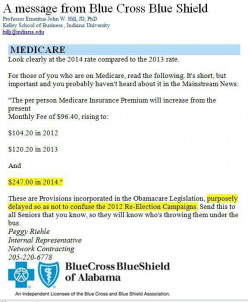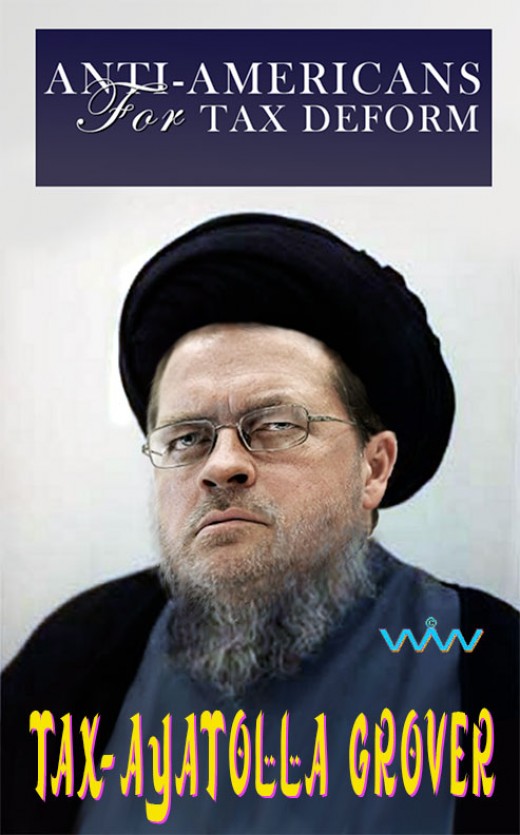Obamacare. Just what does it mean to you.
- JaxsonRaineposted 13 years ago
0
Cody, answer this. Yes or no.
Is a person who makes 25k per year, and gets back 8k in taxes, paying their fair share of taxes?The GOP has sure gotten you hook, line and sinker haven't they?
How is it OK when I pay 15 percent making $25,000 and someone who makes $1 million also pays 15 percent?
The fact is that trickle-down economics haven't worked. It's a failed policy. Just because someone who made $10,000 is now making $12,000 isn't success. Cutting taxes on the rich doesn't stimulate anything. It simply lines their pockets.
What we should do is implement a flat national sales tax. Eliminate the income tax and then you don't have to eventually agree with me that the rich pay far less in taxes than they should.Answer the question Cody.
You don't pay 15 percent making 25k. You pay, at worst, 7.6%. At best, you get back 32%.
Unless you are talking about capital gains, which is a flat tax(flat taxes are fair, everyone pays the same).
1 - My question had nothing to do with trickle-down economics. Answer it.
2 - Having a competetive tax rate for the wealthy, corporations, and small-businesses absolutely does help. We don't have a competitive tax rate for businesses and the wealthy(if you have a small business as a small proprietorship, you can easily get taxed at the 'wealthy' levels even if you are only actually getting paid middle-class income).
Ok, now you have changed from 'the rich don't pay their fair share', to 'they don't pay what they should'.
Should is subjective, you can say you think they should pay more, and that's fine. Saying that they don't pay their fair share isn't.
A flat sales tax would lower the taxes the rich pay and raise the taxes the poor pay. Are you really for that?So what?
Ok, Cigna. Take away all of his salary and split it between employees and members.
All employees would make an extra ~$220 per year. All members would pay ~$0.005 less on their premium as well.
So what if they make a lot of money?The typical Darwinian money-grubbing mantra: "So what, I got mine—screw you!"
The real American Dream exposed . . . http://youtu.be/acLW1vFO-2QActually, it is the American Dream. If you provide a product or service, you can charge whatever you want. If people want it and/or need it enough, they will pay the money. If not, you won't sell it.
Free markets are wonderful.
My point was, the execs at those companies could be paid nothing, and it would have almost no noticeable impact on anybody else.
Don't you know all business of every kind is supposed to be non-profit?
You're wrong on two counts.
1) If the tax rate on income is supposed to be 36 percent and they only pay 15, they are not paying their fair share.
2) A flat tax would impact the rich on a higher scale. If you were to pay 10 percent on everything that you purchased, it would make sense that the rich would pay more because they spend more. 10 percent on a $500,000 trip to Tiffany's would be $50,000. Paying 10 percent for a loaf of bread that costs $2.50 is only 25 cents.Right. So, anybody who doesn't pay the marginal rate isn't paying their fair share?
So what about the bottom 50% of Americans who pay less than 2%? Are they paying their fair share?
What about somebody who makes 25k and gets 8k back as a refund?
You still haven't answered the question Cody. Come on.
No. It goes off percentages, not dollar amounts.
If someone earns $1 million and pays 15% tax, they pay 15% tax. If there is a 10% sales tax, and they spend 50% of their money, they will only pay 5% of their income as tax.
The average top 1%er pays 24% income tax. For a flat sales tax to affect them more than that(let's assume they spend 100% of their income), everybody would have to pay a 25% sales tax.
If they only spend half of what they make, the sales tax would have to be 50%.
Wasn't directed at me but I'll answer...
Yes it's fair because what our tax code is telling the person is "You're so poor...ha, ha, ha....we need to GIVE YOU MONEY just so you can survive."
From the Wall Street Journal--The Health-care Overhaul: A Timeline for Consumers
http://online.wsj.com/article/SB1000142 … +consumers
Here's a guide to the status of some of the most notable changes affecting individuals—and their wallets. (Note: Some provisions affect older plans or policies on a different schedule, or not at all.)
In Effect Now
Group health plans are required to cover the children of enrolled parents until age 26. "Child" includes stepsons and stepdaughters, adopted children and eligible foster children.
A small-business health-insurance tax credit is available to employers with fewer than 25 employees, or the equivalent.
According to the Government Accountability Office, only about 170,000 employers claimed this credit in 2010 out of an estimated pool of up to 4 million eligible firms, perhaps because of the complexity of calculating the credit. Terms of the credit change in 2014.
New plans and policies are required to cover certain preventive services without copayments, including immunizations, routine mammograms for women age 40 and older, and colorectal cancer screening beginning at age 50. For a partial list, see HealthCare.gov.
Flexible-spending-account funds may no longer be used to pay for nonprescription drugs except insulin, but they may still be used for supplies such as bandages, contact lenses and blood-sugar test kits. According to Mr. Luscombe, some health-care providers are writing prescriptions for over-the-counter medicines for their patients to get around the new requirements.
Indoor tanning parlors must pay a 10% excise tax on amounts charged to clients.
Beginning this year, most employers filing 250 or more W-2 forms must list the cost of health coverage on each form. The reporting is for informational purposes only.
Effective in 2013
A 3.8% tax on net investment income takes effect for most joint filers with adjusted gross income above $250,000 ($200,000 for singles). It applies to gross income from interest, dividends, annuities, royalties and rents—unless the income is from a business the taxpayer actively engages in—and to net gains from investments. It might also apply to large net gains on the sale of a home. (For more details, see "Get Ready for the New Investment Tax," June 30.)
A 0.9% Medicare surtax will apply to most joint filers' wages and self-employment income above $250,000 ($200,000 for singles).
The threshold for taxpayers claiming an itemized deduction for medical expenses rises to 10% from 7.5% of adjusted gross income. For taxpayers (and spouses) 65 or older, however, the AGI threshold continues to be 7.5% until 2017. For those subject to the alternative minimum tax, the threshold remains 10% of AGI.
Contributions to flexible spending accounts are capped at $2,500 per employee, down from $5,000 or more per employee. The new cap is adjusted for inflation beginning in 2013.
A medical-device excise tax of 2.3% of the sale price applies to certain products. The tax doesn't apply to eyeglasses, contact lenses and hearing aids, but will apply to items such as pacemakers, stents and artificial hips. The House has repealed this provision, but it's unclear if the Senate will act.
Effective in 2014
The first penalties will be levied on individuals without insurance. The penalty is a flat amount or a percentage of income, whichever is greater, and it phases in over three years.
For 2014, the dollar penalty is $95, rising to $695 as of 2016. The 2014 income percentage is 1%, rising to 2.5% as of 2016. This amount is uncapped, says Mr. Luscombe—a fact relevant to the wealthy who self-insure.
In general, individuals with employer-provided coverage meeting minimum standards will be exempt from the penalty, as will people covered by Medicaid and Medicare and members of a religion opposed to accepting benefits.
Large employers (more than 50 full-time workers or the equivalent) must pay an assessment if they don't offer employees certain minimum coverage at an affordable rate.
Each state must establish an "exchange" offering health plans to individuals and small-business employers. Coverage will be classified as bronze, silver, gold or platinum. Small businesses are defined as those with fewer than 25 full-time employees and average annual wages of less than $50,000 for those employees. If a state doesn't comply, the Department of Health and Human Services will operate a substitute exchange.
Insurers must not impose exclusions for pre-existing conditions, or annual or lifetime limits on the dollar value of health benefits, except in cases of fraud. (A similar provision affecting enrollees under age 19 took effect in 2010.)
Effective in 2018
So-called Cadillac plans—employer-sponsored health coverage exceeding a certain value—is subject to a 40% excise tax. The threshold is $10,200 for singles and $27,500 for families, although those figures might be adjusted upward based on health-care inflation before then.
Write to Laura Saunders at laura.saunders@wsj.com- JaxsonRaineposted 13 years ago
0
BTW Cody
If you don't think it's fair that you pay the same cap. gains tax rate as millionaires do, maybe you should look at Mitt Romney.
"Eliminate taxes for taxpayers with AGI below $200,000 on interest, dividends, and capital gains" You compare apples to oranges.
The person in that scenario would have to have kids, a business losing money or a LOT of educational/medical expenses.
The rich on the other hand pay less because they get to reclassify their income. The poorer people get tax breaks because otherwise, they may not be able to feed their kids, run their business for more than a year or have any assistance for educational/medical expenses.haha Cody. Come on, just answer the question.
Someone who makes 25k and gets 8k back in taxes. Paying their fair share or not?
If you are concerned about fairness of taxes, you should be concerned about any unfair taxes no matter the income level.
All it takes is kids.
What about someone who makes 25k and gets back 3k? Are they paying their fair share?
What about someone who makes 25k and pays 1%, are they paying their fair share?
You are arguing that it's ok for the poor to have deductions and credits, but not the rich.I know that. I'm not disputing that.
But how can you continue to say the rich aren't paying their fair share, when they are shouldering the burden? The poor aren't paying taxes, many of them earn money from taxes. Why is it unfair for the rich to make up for what the poor aren't paying?I'll tell you what, you give me a salary of $250,000 a year, and I'll gladly pay the same tax rate as if I was making $25,000. Also keep in mind that anyone making over 109,000 (or somewhere around there) pays almost nothing in FICA taxes compared to what they would pay if there was no phase-out. So really, you're just getting taxed on your income at that point. So tell me that the rich don't get deductions again?
Again, you didn't answer my question. It's very simple.
You say a wealthy person paying 24% of their income isn't paying their fair share.
Is a person who makes 25k who (let's make it simple) pays nothing at all, paying their fair share? Yes or no Cody. It shouldn't be so hard to answer.
People who make 250k pay a rate about 10 times higher than what people who make 25k pay.
If you paid the same rate at 250k and 25k, that would be a flat tax, we don't have that.
FICA is different, because it's toward a benefit that everyone enjoys equally. If the rich paid more into FICA, they would also get more out of it, so that is irrelevant.
I never said the rich don't get deductions. You clearly don't understand what I am saying, as you keep claiming I say things that I don't.
Just answer the question Cody. I want to see if you can be honest with yourself.
Is someone who pays no taxes paying their fair share?First off, someone who is making $250,000 is NOT paying ten times more than someone who makes $25,000.
Secondly, I understand why their are FICA limits, however, it doesn't make the fact that the rich pay less in payroll taxes "irrelevant" as you still get the same outcome regardless of the why.Cody, you didn't answer my question. If you know what is unfair, you should also know what is fair. Why won't you answer?
Yes they are. The top 5% of Americans, starting at just $154,000, pays an average tax rate of 20%. The bottom 50%, with incomes up to 32,000, pays an average of 1.85%.
Yeah, there are variances. A single person at 25,000 compared to a family of 5 at 250,000 will have different rates.
But a family of 3 at 25k will pay negative 13%. A family of 3 at 250,000 will pay 21%.
No, the rich pay more in payroll taxes. They can pay a lower percentage than the poor, but as the benefit is equal to everyone that is by definition 'fair'.
Even if you take that into account, the bottom 50% of Americans still don't pay anywhere near the tax rate of the rich. When I say the bottom 50% pays 1.85%, that doesn't include EIC or child tax credits, which is where people get thousands of dollars in return.
I'll answer your question about fairness. I don't believe fairness of contribution is measured only by the amount of money one puts into a system. I believe that workers who make $25,000 per year are just as necessary to the functioning of our society as are those who make more than $250,000,000 per year. Retail workers, laborers, secretaries, custodial workers, nursing aides: we need them and their contribution is no less valuable than a dentist, lawyer, or accountant. To me, it is "fair" for them to be able to have some of the same basic amenities that those who make more money have: a decent home, affordable education for their kids, internet access, reliable transportation, health care, a healthy and varied diet, and reliable transportation. All of these things cannot be had on a salary of $25,000 per year, especially for a family.
So, yes, it is "fair" to provide them with a tax break as a recognition of the contribution they make to society that is not as well rewarded monetarily as, say, a professional basketball player.Ok. That's not what I'm talking about though.
I'm trying to get someone to explain why, when 1% of Americans pay 24% of their income, and half of Americans pay less than 2%, the claim is made that the 1% aren't paying their fair share.
All those people who get tax refunds - their refunds are paid by the taxpayers that are actually paying taxes.That was my answer. You are thinking of fairness only in terms of money. I am thinking of it in terms of societal contribution.
I'm not talking about societal contribution. I'm not saying who is better.
The topic is whether or not the rich pay their fair share of taxes. That's monetary.
If it's fair for poorer people to earn money from tax returns, why is it not fair that the rich are paying 24% of their income?
It's because their share should be more is the reason it's said they don't pay their fair share.
Don't look at the number, look at the percentage.
There's a infinite pot of money, the rich are taking out more than they are giving back.
So if they are pocketing 90% of the money, they should return the appropriate amount.The top 1% earn 16% of the income in America.
They pay 37% of the taxes.
Last time I checked, 37 was more than 16.
All these arguments are simply made without researching or understanding the real data. Everybody knows that the middle class pay more taxes than the top 1%, because the news says so all the time...
Except they are wrong.
Everybody knows that GE got a tax refund last year, some $3 billion, because the NYTimes said so.
Except they were wrong.
So how is it, that when the top 1% pay twice as much per dollar earned, compared to the 99%, that they somehow aren't paying their fair share?
Is someone who never puts anything back into the pot paying their fair share as well?
- JaxsonRaineposted 13 years ago
0
What would be fair?
If the top 1% paid 35% of their income? 40%? 50%? 75%? 100%?The actual amount of what is "fair" will always be in dispute. We must vote for and support those who most closely align with our values and hope they will follow our wishes by adopting tax policies with which we can reasonably agree.
Fair is treating everyone equally.
A progressive tax system is more than fair toward the poorer citizens.
The more progressive the system, the less fair it is toward the rich, and the more generous it is toward the poor.
I just want Cody to explain why 24% isn't fair, and 0%, or -32%, is.
If we truly wanted fair, we would have a flat tax on disposable income. But, caring about those who are struggling, we give money back for EIC, child tax credit, etc.You fallacy is in believing that treating everyone equally has only to do with money.
PrettyPanther
We are talking about tax rates. Tax rates have to do with money. The subject isn't social equality, or economic contribution, or anything else.
The only way to look at the taxes people pay, is to look at money.
There is no fallacy. Taxes paid only have to do with money.
Taxes. Money.
Got it?True, but it is all part of a bigger picture, isn't it? You cannot divorce economic issues from social ones, unless you care only about money.
"The big picture" is the sum of all the little pictures. Yeah, there is a lot more to fairness than taxes. But whether or not the rich pay their fair share of taxes, that's a monetary issue. It's how much they pay.
I disagree and I've explained why. I gather that you don't see it that way. My value system differs from yours, apparently.
It's not about value systems. It's about understanding the topic.
What a person pays in taxes compared to another person is a clear-cut ratio. That's all it can be.
What a person pays into taxes and what they contribute to society isn't the same thing. You don't look at how someone contributes to society to calculate their tax rate, you look at their income.
You keep trying to drive the topic toward fairness in general, when my whole point has been about whether or not the rich pay their fair share of taxes. It's about numbers, because taxes are about numbers.You say it's only about numbers; I say it's about more than that. You are trying to say that giving tax breaks to the poor has nothing to do with fairness because, if all you consider is numbers, then yes, it isn't fair. Most people believe that the working poor deserve a break. Maybe they don't think about why the working poor deserves a break, but I have thought about it, and I believe that the working poor should have the same basic amenities as everyone else, the amenities I listed above. And the reason I believe that is I that I don't believe a highly paid football player is more productive or more deserving than a teacher, laborer, secretary, or firefighter.
It IS about more than just money; it is about values. It's about time we stick up for our values and stop worshipping the almighty dollar.But that's not what I'm talking about. I'm specifically talking about the claim that the rich don't pay their fair share. I'm not talking about whether or not it's fair to give tax breaks to the poor.
I do think that the poor should be given tax breaks. I agree with you.
But everything you just posted isn't on-topic with my point. My point is about money, because the point is whether the money they pay is enough money or not enough money.I am saying that I believe the rich should pay a higher proportion of their income in taxes than the poor. I am also saying I can see where some people would say that is not "fair" and I would agree with them if the only consideration about what is fair with regard to taxes had to do with percentages of income paid in taxes.
I've also said that the amount of taxation for any level of income is up for debate and that there will always be disagreement on that point. I personally believe that, in this current economic recession, it is appropriate to raise taxes on those who make over $250,000 and that it is fair for the reasons I have given.
If you don't get what I'm saying, then I give up trying to get you to see it.
OK, looks like it is time for me to jump in here.
Has anybody, READ IT??
I have made three attempts at it, and, I get all messed up in the translation.
SO, Here it is for you people to try to figure out.
OLY
Bill Text Versions
111th Congress (2009-2010)
H.R.3200
http://thomas.loc.gov/cgi-bin/query/z?c111:H.R.3200:This may be more palatable, OLY—I hope so anyway . . .
Key Features of the Law
http://www.healthcare.gov/law/features/index.html
Looks to me as though the perfect solution is to just ban private ownership of any company.
What do you think?Compare it to a wealthy person buying a home that costs $20 million, while the average worker purchases a home that costs......$150K.
Well of course the wealthy person could afford more home....they have more money!
Of course they pay more taxes in society....they have more money!!!
Them having more money in our society means they have more power. With greater power comes greater responsibility.
If they can't shoulder that responsibility they should forfeit all their money/power so someone who can shoulder it can step in.
A wealthy person crying about more responsibility in society is comparable to an adult crying to a kid that they have more responsibility in a household!What about the kid complaining that the adult isn't paying his fair share of the bills, while the kid isn't paying anything and is receiving money from the adult?
Which the kid can do because the ADULT is blessed with the ability to make money and be labeled as an adult. The adult signed up for that job. If they can't handle it, they should dissolve the household and move back in with their parents and reside as dependents.
It would be incredibly ignorant for my daughter to complain that I ain't paying my share of the bills and I reply, "Well why don't you pay half then" when I know she doesn't have it to pay it.
With greater power comes greater responsibility.
I guess you can say that the wealthy are the adults in our society.Wait, you are seriously arguing that an adult who pays all the bills, isn't paying his fair share of the bills?
It would be wrong for your daughter to claim that you don't pay your fair share of the bills if you pay all the bills. Why? Because even though you both enjoy the benefits, you are paying for both yourself and for her. You simply can't say that the person paying 100% isn't paying their fair share. There's nothing more to pay.Yeah, it's possible the parent is working and not paying the bills. Which is what is happening in our society. The wealthy are working and earning (metaphor), but they aren't paying the mortgage! They're sitting on the money and then complaining when their children ask them, "Mom/Dad, can you please pay the mortgage?"
They then ask the kids to go out and get a job.
That's basically what's happening in our economy.
Then we have kids saying the most peculiar thing when they agree mom/dad doesn't have to pay the bills. That they'll just sell some lemonade and pay the mortgage for them.
That's.....admirable I guess...but crazy.Did you read the part about how the top 1% earn 16% of the income, but pay 37% of the taxes? You claim they aren't paying the bills, but they pay more than double their share based on what they take out.
The top 20% pay more than their share of income into taxes. Every other quintile pays less. You still seem to think that the rich are taking out more than putting in, but that's not the case.
- JaxsonRaineposted 13 years ago
0
In other words, being in the 25% bracket doesn't mean you pay 25% in taxes. It means that *some* of your *taxable* income is taxed at 25%.
Oh Wizard... a little advice. Look at effective tax rates, not top marginal rates. Nobody paid that much in taxes.
If we returned to the same effective tax rates as the 1960s, the government would have made an extra $90 billion in 2009 off of the rich."Oh Wizard... a little advice. Look at effective tax rates, not top marginal rates. Nobody paid that much in taxes."
True. Especially Mittens. I saw somebody waving his 2011 income tax filings on TV last night. It was as thick as a NYC phone book. Must have been at least 500 pages. I wonder how much it cost him to pay a retinue of tax lawyers and CPAs to find every last tiny loophole???
Somebody should waterboard Grover Norquist the malicious, lying, little weasel.
"Who the hell is Grover Norquist?" - George Bush, Sr., this week.
Priceless! This is better than when he saw the first supermarket scanner and exclaimed that what a great device. They had been out for years. That tells you that he didn't have a clue then.
His idiot son thought he would play president and mire us in wars when he didn't have a clue. But he was the decider.
Related Discussions
- 152
Obamacare increase the avability of healthcare in what ways?
by Judy Specht 9 years ago
I have been listening to how the government has a billion dollars for getting people to sign up for the Affordable Healthcare Act. Would that money have been better spent training more doctors and building new hospitals? New Jersey has closed how many community hospitals in the last few...
- 59
The train wreck that is ObamaCare
by Alexander A. Villarasa 11 years ago
What does one expect of a piece of legislation that was voted on, and passed both by the Senate and Congress, signed into law by Pres. Obama, and certified by the Supreme Court as being constitutional? High Hopes of course, but in the case of the Affordabe Health Care Act (popularly...
- 50
Do you believe that the nuisance known as Obamacare will finally be repealed? W
by Grace Marguerite Williams 7 years ago
Do you believe that the nuisance known as Obamacare will finally be repealed? Why? Why not?I believe that the government SHOULD NOT be in private affairs such as health care. I believe that health care is the sole responsibility of the individual. If individuals want health care,...
- 41
Obamacare Already Inflicting Damage
by lady_love158 14 years ago
http://online.wsj.com/article/SB1000142 … #printModeAnd libs called the dire predictions scare tactics and now we're beginning to see them come true!
- 22
What are the 6 ways Obama"care" is a total waste of time, energy, and money wher
by Grace Marguerite Williams 12 years ago
What are the 6 ways Obama"care" is a total waste of time, energy, and money where there arehospitals and/or other medical facilities that offer very low cost and/or free health care?The "purpose" that President Obama "intended" for his to be implemented...
- 46
Trump's HealthCare plan to repeal ObamaCare
by Susie Lehto 9 years ago
HEALTHCARE REFORM TO MAKE AMERICA GREAT AGAINSince March of 2010, the American people have had to suffer under the incredible economic burden of the Affordable Care Act—Obamacare. This legislation, passed by totally partisan votes in the House and Senate and signed into law by the most divisive and...






















